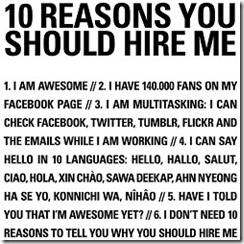 You’ve been in your job search for a while. Your resume is solid. The results from your career speak for themselves. Everyone is excited to meet you, and your interviewing skills are perfected. Why are you not getting the job offer?
You’ve been in your job search for a while. Your resume is solid. The results from your career speak for themselves. Everyone is excited to meet you, and your interviewing skills are perfected. Why are you not getting the job offer?
There are several reasons why a great interview fails to become a job offer.
Simply put, something in the hiring company’s due diligence is showing you as a risky candidate.
Right or wrong, you may never know what it is. But you can do some background work to try to find out, and correct it.
Consider that at a minimum, most employers will Google your name. If an employer is going to do deeper checking into your background, they will often let you know that some kind of background check will be performed. Local, county, state, multi-state, and national records databases are available to employers for this purpose.
However, it’s usually what shows up in Google about you that is enough for an employer to pass on you for the job offer.
A lot like your credit score, you want to know what is being said about you online – before it’s an issue in your job search. And, you want to be sure you are not adversely affecting your online presence by your own effort.
Background Scenarios
There are several scenarios that you should audit what Google is turning up on you.
- Information about you that is true.
- Information about someone else, but shows, because you have a similar name.
- Information that is false that someone else has posted.
- Information that you shared but is misunderstood.
In none of these scenarios can you change what is on the web. Sure, you could ask for retraction, and other after-the-fact correction. But, once it’s published on the web, it will always exist somewhere – without the correction. And, in these cases, can confuse, or suggest to an employer that you are a risky candidate.
What To Do
- Be vigilant about your online reputation. You want to know what others can see about you online. Don’t wait until it’s too late; find out now. Many records are public, and instead of going to the library to look at back-issues of newspapers for information about your past, it is all easily available using Google for an online search. Many public records are also online through the offices that manage them through various information availability initiatives. You want to know what Google is reporting about you.
- Be honest up front. If what Google is saying is true, you do have a criminal record, or other aspect about your distant past, be sure to disclose it. DON’T omit something from your job application, or in the interview, thinking they might not find out about it. When they do, you will be eliminated not because of what you did YESTERDAY, but the assumption that you are dishonest TODAY. Many employers will look beyond a past discretion, if you disclose it, and clarify what you learned from that lesson – assuming you are the best candidate for the job you are interviewing for.
- Clarify who you are not. If you have a common name, or the name of someone who is notorious, clarify that with your interviewer.
- Improve your online presence. This is an investment in time, to be sure. However, there is no way to delete things from the internet. The only way to change your presence on the web is to replace it with better information that represents you TODAY, which ultimately will lower the relevance of ancient history on the web about you. (There are many other blogs and how-to guides available on what specifically to do, Google “improve online reputation” to find a number of resources.)
- Think carefully about what you share online. When you are using Facebook, Twitter, and other online tools or social media, take great care in sharing information that you would not mind seeing on the front page of the New York Times, or on the 6:00 evening news. What might seem like a harmless comment to your buddies, can easily be misinterpreted by another reader and taken out of context.
Barton Professional Placement works with both clients (employers) and candidates to help cut through this quagmire so good people can find good jobs at good employers. However, not all professional placement groups work this hard to achieve results.
As an candidate or applicant, we hope you look at our open jobs and apply for those that fit your skill set. And, think about what is online about you. As an employer, we hope you give applicants a second chance, and just ask them to explain, before eliminating great skill-sets that your organization might use to be successful.

